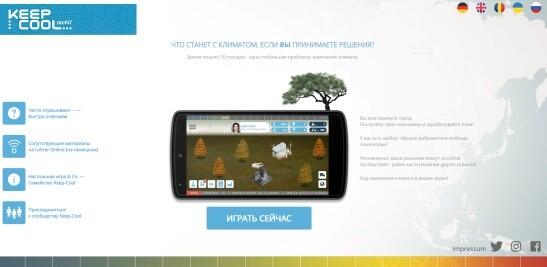Business game-based education on renewable energies in Germany and Eastern Europe
International project funding
Subject and goals of the project
The implementation of the energy transition is an essential cornerstone of international climate protection and compliance with the 2-degree target as the internationally agreed planetary boundary. Furthermore, the energy transition is a contribution to achieving the UN's Sustainable Development Goal (SDG) 7 "Affordable and clean Energy". In the project, a simulation game-based educational approach using mobile devices (smartphones and tablet PCs) was used to fundamentally sensitize and qualify multipliers (university lecturers, teachers) and other target groups (students and pupils) on the aforementioned topics in a cooperation project in Germany, the Republic of Moldova, Romania and Ukraine. The educational approach already designed for Germany with DBU funding was adapted to the requirements in the target countries. Supplementary teaching materials were generated to introduce and deepen the subject matter, and new functionalities and content were integrated into the web-based simulation game. While in the Republic of Moldova the educational project focused on the university sector, in Romania the focus was on teachers and pupils. In Ukraine, all three target groups were taken into account. Humboldt-Universität zu Berlin cooperated with NGOs, universities and environmental centers in the target countries. The project directly reached many hundreds of multipliers in 64 workshops and events. Indirectly, a significantly higher number of schoolchildren and students were addressed by the project's educational offerings. The multipliers in the participating countries were trained in the use of the simulation game and the accompanying materials in specialist workshops. The potential for conveying knowledge about renewable energies, current research and development approaches, the significance of the energy transition for CO2-neutral economic activity, questions of climate change adaptation, aspects of international cooperation in the field of energy policy as well as technology developments and climate protection were highlighted. New developments have made it possible to use the online planning game as part of project weeks and days. In-depth statistics on the course of the game and the analysis of the simulated scenarios offered lecturers and teachers new options for teaching the aforementioned content.
Innovation and exemplary nature of the project
The digital simulation game Keep Cool mobile for smartphones and tablet PCs has been further developed into an educational offering on climate policy and renewable energies available in five languages. In Eastern Europe, the effects of climate change have so far been addressed much less in the media than in Germany. The simulation game offers the opportunity to encourage people to think about climate policy issues in a playful way. With the translations of the game now available, very good conditions have been created for a continuation of the international exchange on climate policy for the educational sector. The cooperation between Humboldt University of Berlin, EcoVisio and several other NGOs from Romania, Ukraine and Moldova formed a good network of committed partners. Video tutorials and accompanying materials were designed for outreach as well as for pre- and post-workshop preparation.
Special aspects of the project
- The digital simulation game is available in five languages (German, English, Romanian, Ukrainian, Russian).
- On the projekt homepage, teachers can download accompanying materials for preparing and following up a game session.
- Eduversum, an educational publishing house with a wide reach, was acquired as a partner.
- The project received an award in Germany as a "Workshop N" projekt.
- The Potsdam Institute for Climate Impact Research (PIK) was a close cooperation partner in the development of the simulation scenarios.
- The project makes concrete contributions to communicating the SDGs "Affordable and clean energy", "Responsible consumption and production", "Climate action" and "Quality education.
Funding subject: Renewable energy, energy conservation and energy efficiency
Cooperation partners:
- Humboldt University of Berlin, Institute of Agricultural and Horticultural Sciences
- EcoVisio, Chișinău, Republic of Moldova
- Zelena Chvilia, Kiev, Ukraine
- Asociatia Mioritics, Constanta, Romania
Associated partners:
- Potsdam Institute for Climate Impact Research (PIK), Potsdam, Germany
- Global Climate Forum (GCF), Berlin, Germany
- Eduversum GmbH, Wiesbaden, Germany
- Leibniz Association, Berlin, Germany
Locations: Romania, Ukraine, Republic of Moldova
Funding period: December 2017 to January 2020, Download final report
Project costs: Total volume: 178 206 Euro, DBU funding: 124 861 Euro
DBU-AZ: 33898
Note: Translation of the German version with DeepL
Last updated: 15.11.2021




